Winston Duke, the Star of Jordan Peele's New Horror Movie, Is Smashing Stereotypes
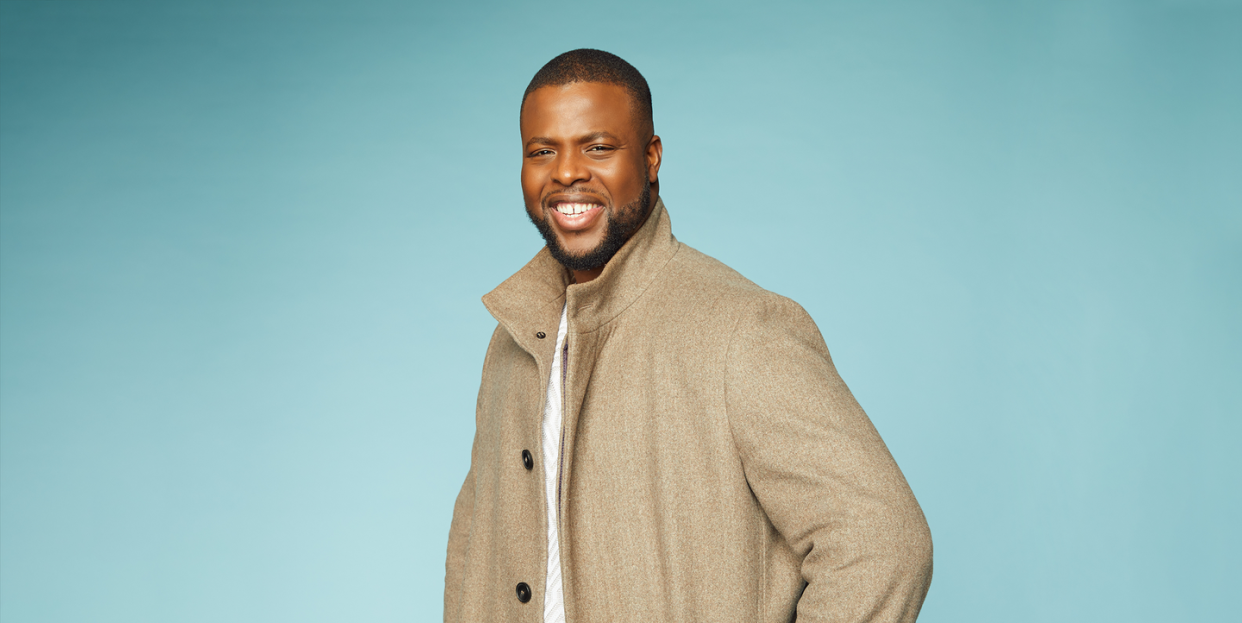
Even in the bleakest of settings-like a chilly, dimly-lit studio in Midtown Manhattan-Winston Duke is never without a smile. It’s the first thing anyone would notice about him, right after his towering height, fresh haircut, and the faint trace of a Tobagonian accent.
Perhaps that's why, even at 6 feet, 5 inches and 230 pounds, the actor seems approachable...despite the fact that he’s towering over two publicists and the photographer responsible for capturing every inch of his frame. Or maybe it’s because the way he’s two-stepping to Silk City and Dua Lipa’s 2017 hit song “Electricity” would make anyone want to dance alongside him.
Every time the camera clicks, Duke tilts his head back and lets out a rich, throaty laugh. It’s the same deep, husky sound of merriment he delivered during his portrayal of M’Baku, the leader of the mountainous Jabari tribe in the 2018 blockbuster Black Panther. And his gentle giant qualities have certainly served him well. This year, he'd moved from one larger-than-life character to the next: On big screens around the country, moviegoers can now catch Duke as Gabe Wilson, a married father of two in Jordan Peele’s new social thriller film, Us.
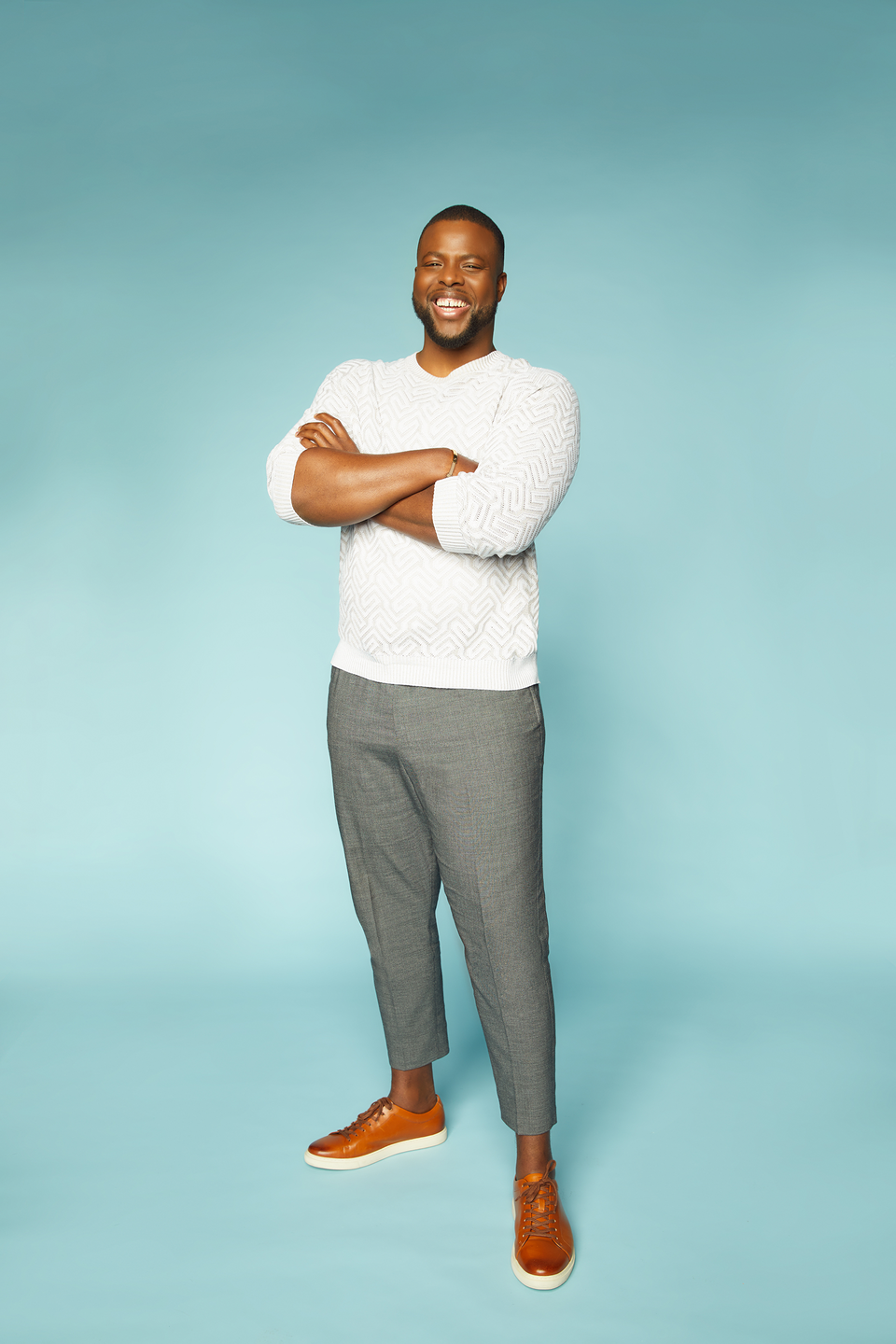
Still, the more Duke rises, the more he is cognizant of Hollywood’s propensity to typecast domineering Black actors like himself. But Duke is not interested in simply portraying Black men as intimidating. In fact, in Us, he does just the opposite, reclaiming the narrative around masculinity in a society that tells him that because of his size and skin color he should look, feel, and think a certain way. But in this story, Duke's character is secure enough in his manhood to let the women lead-and in real life, Duke is showing by example that strength comes in all different sizes, packages, and genders.
“After Black Panther, a lot of the roles that came my way were these tough guy, bruiser types who have a heart of gold,” Duke says about the Black-led Marvel film that went on to become the highest-grossing superhero movie in the country. “We’ve all seen that guy before. I really want to be able to express myself in unconventional ways that pop culture doesn’t readily afford. Those are the roles I seek out-like Gabe, because a lot of men live within the spectrum of masculinity. You just don’t see it that often on screen.”
Without giving too much away, in Us, Gabe embarks on a family getaway to Santa Cruz with his wife, Adelaide, played by the brilliantly frightening Lupita Nyong’o, plus their two kids, Zora (Shahadi Wright Joseph) and Jason (Evan Alex). Their vacation quickly turns into a nightmare when eerie dopplegängers who just so happen to look like the Wilsons show up on the doorstep of Adelaide’s childhood beachfront home.
For his part, Duke brings much more to Peele’s visceral horror film than a physically imposing presence balanced by warm facial expressions. There’s heft in Duke’s depiction of Gabe, who is forced to spring into protective mode for his family.
“What drew me to the character of Gabe was that he was never any one thing in any moment throughout the film,” the 32-year-old says. “He changed from being an aloof father who sees the world through a lens of patriarchal manhood, to being a better partner for Adelaide as the movie goes along. He has a really great character arc that’s not the classic, stoic cowboy with a hard edge. Gabe is expressive. He’s both sexy and sexual, while also being playful. With Black men on screen, it’s usually very monolithic; I just had a great time playing the different spectrums of the character.”
All at once in Us, Duke has to invoke fear and succumb to vulnerability, while deploying comedic one-liners that add just the right amount of levity to the movie’s scariest moments. Of course, Duke isn’t the only actor in Peele’s latest who digs deep for their performance. Nyong’o, Wright, Alex, Elisabeth Moss, and Tim Heidecker all play dual roles, enrobing themselves in red jumpsuits and leather fingerless gloves to embody the frightening essence of their characters' monstrous twins. The result is a story that will have you on the edge of your seat-yelling “run!” at the screen-while also questioning your identity and the blurred lines between good and evil.
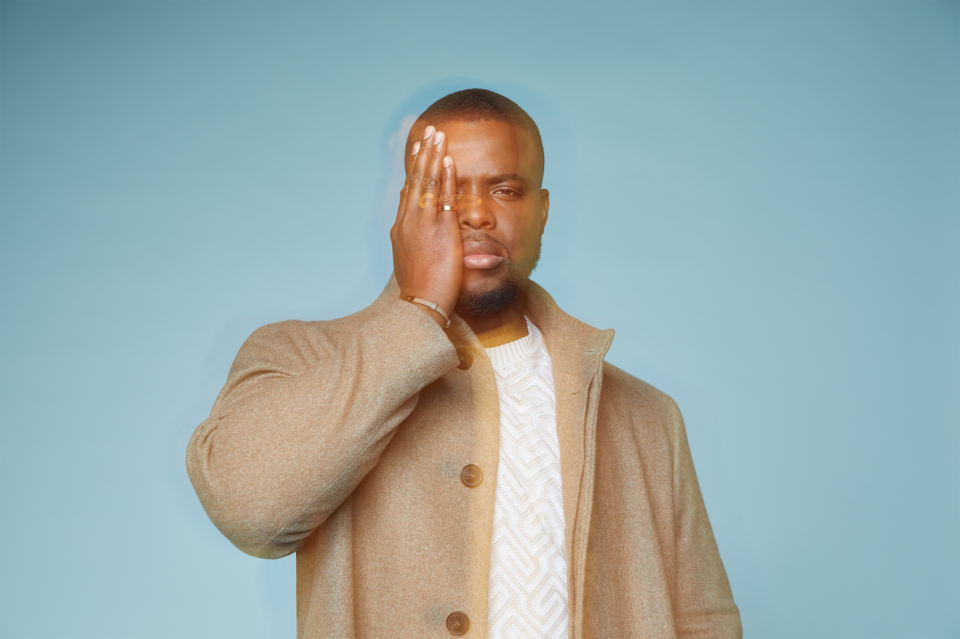
Duke describes the differences between his character, Gabe, and his character’s doppelgänger as examples of what happens when one person has proximity to privilege, and one doesn’t. That nuance is thanks to the direction of Peele, who-just like he did in his Oscar-winning first film Get Out-always finds a way to breathe life into complex characters while placing them in uncomfortable situations. But most importantly, Peele dares viewers to hold a mirror up to themselves, in hopes that they will come to terms with the fact that we can be our own worst enemies when power and wealth go unchecked.
“Jordan took this ordinary family dynamic and warped it to really make you look at the monsters we create,” Duke says. “You end up asking yourself whether the violence is perpetrated with scissors as the weapon-or if the violence is rooted in oppression.”
It’s the reflection staring back at us that Duke wants you to pay close attention to when watching this social thriller, in addition to pondering the “big questions.” These are questions that may not beg for immediate answers, but prompt the kind of dialogue that will have audiences sitting in the theater debating long after the credits have rolled. For starters:
What does it mean to finally have an affluent Black family front and center in a scary flick-with a character who doesn’t die in the first 15 minutes? And after the inevitable success of Us, will Hollywood finally understand that Black actors and creators can offer more to the horror genre than Blaxploitation movies and creepy hood tales?
“This is a time in culture when we get to tell these stories, challenge perception, and interrogate Black psychology in film,” says Duke. “When it comes to films like Us, Get Out, Moonlight, and Sorry to Bother You, there are a lot of strong Black directors interrogating the concept of not being any one thing. You’re a product of your environment, and you’re susceptible to environmental forces. That really changes how your mind works.”
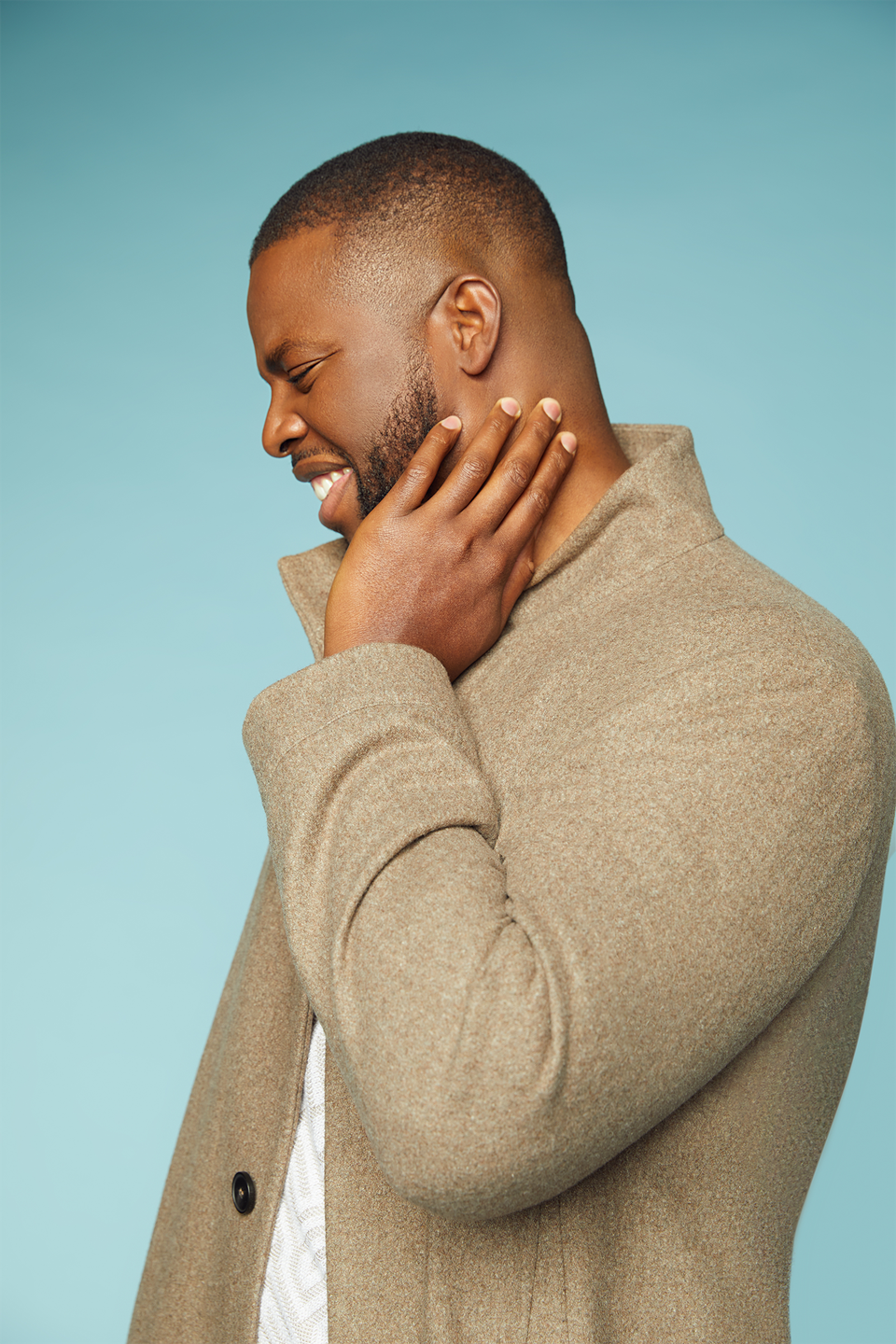
Transformation of the mind is something the actor is intimately familiar with. Around the age of 9, Duke emigrated with his single mother and older sister from Trinidad and Tobago’s small village of Argyle to Brooklyn, New York, so his sister could pursue her dreams of becoming a doctor. As an introverted kid, Duke struggled with assimilating to a foreign culture. Still, despite spending his formidable years on the East Coast, he says he now not only understands the significance of having Black representation on the silver screen, but he is also humbled by the weight of carrying the torch of the Caribbean-born artists before him.
“It feels great to be a footprint of my own people, and to give them a sense of pride in a space where they don’t always see themselves,” he says. “At least now they can say, ‘Hey: Our food, our upbringing, and all those things helped create that guy, and he’s sharing our paradigms in a way that affects others-so in some degree, we can also influence others.’”
Driven by a need to tell stories, Duke finally found his footing in high school. At the encouragement of one of his Spanish teachers-who noticed Duke exhibited a certain flair when presenting in front of his peers-he joined the school’s theater club, and soon graduated to attend the University of Buffalo and study theater.
His enrollment in a master of fine arts program at the Yale School of Drama, however, is when everything came full circle for the budding actor. On his very first day, Duke met a young woman named Lupita Nyong’o, who greeted him with a smile and showed him around campus. Duke later joined a theater group for actors of color along with Nyong’o, a group that, coincidentally, was co-founded by their future fellow Black Panther star and Yale graduate, Angela Bassett.
Nearly a decade later, the pair has shared on-screen moments in both Black Panther and now, Us. And Duke doesn’t hesitate to offer up the valuable insight he’s gained from the 36-year-old Oscar-winning actress.
“Lupita leads by example,” Duke says. “When it comes to the kind of artist and business person that I could be in the industry, I can see that because a friend of mine is doing it, it’s possible for me too. She’s given me financial advice on how to set up my team and the organization around myself. It’s an ongoing relationship of conversation."
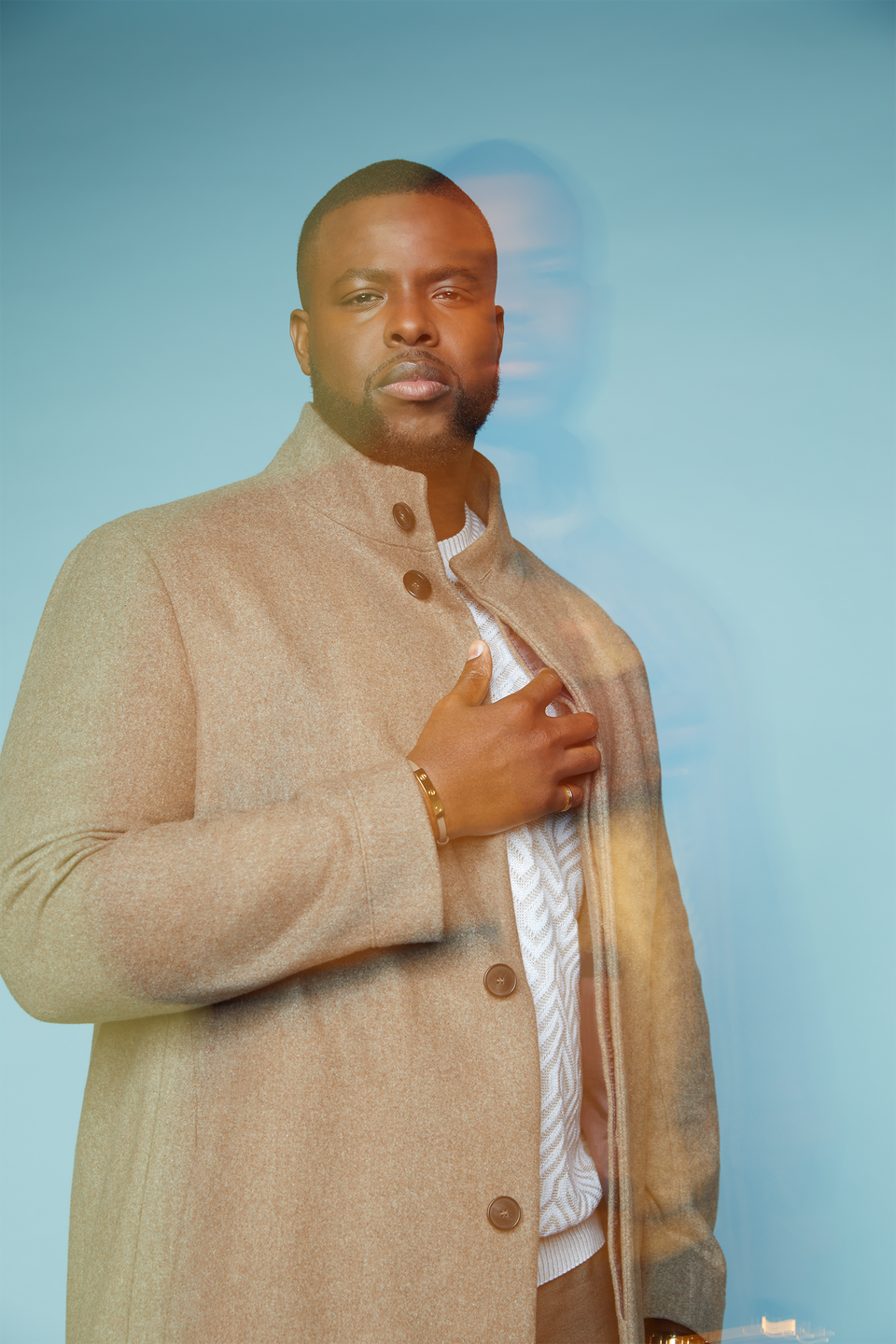
Before his big break in Black Panther, however, Duke, like most actors, had to take on small roles, starting out with bit parts in series like Person of Interest, Law & Order, and Modern Family. Though his passion for acting never waned, the trying period of constantly auditioning and waiting for his big break tested Duke; he admits to often questioning whether he should give up acting and seek out another profession.
“When I couldn’t understand why I wasn’t booking more jobs, the thought of quitting always surfaced,” Duke says. “But I was being prepared and set up for the hardships to come. It taught me patience, resilience, and how to be steadfast. After enduring that, now, I know that if I keep doing the work, the success will come.”
And the accolades and opportunities have arrived-suddenly, and at breakneck speed, with no signs of slowing down. Fortunately, Duke says his family and friends have kept him grounded, and his mother and sister often accompany him on whirlwind promotional tours. Crowding his inner circle with those who know him best is a deliberate effort; Duke says it’s the only way he can maintain any sense of order when it comes to his newfound fame.
“I keep my family around and the friends who’ve helped me to grow as a person, because I’m interested in growth and process,” Duke says. “These are the people who have taught me about race, power, privilege, gender, and the LGBTQ community, and helped me to grasp a better understanding around these sensitive subjects. I can’t always control the impact of something or the finished product, but I can control the process going around me and the amount of time I give to people who are both healthy and unhealthy to me.”
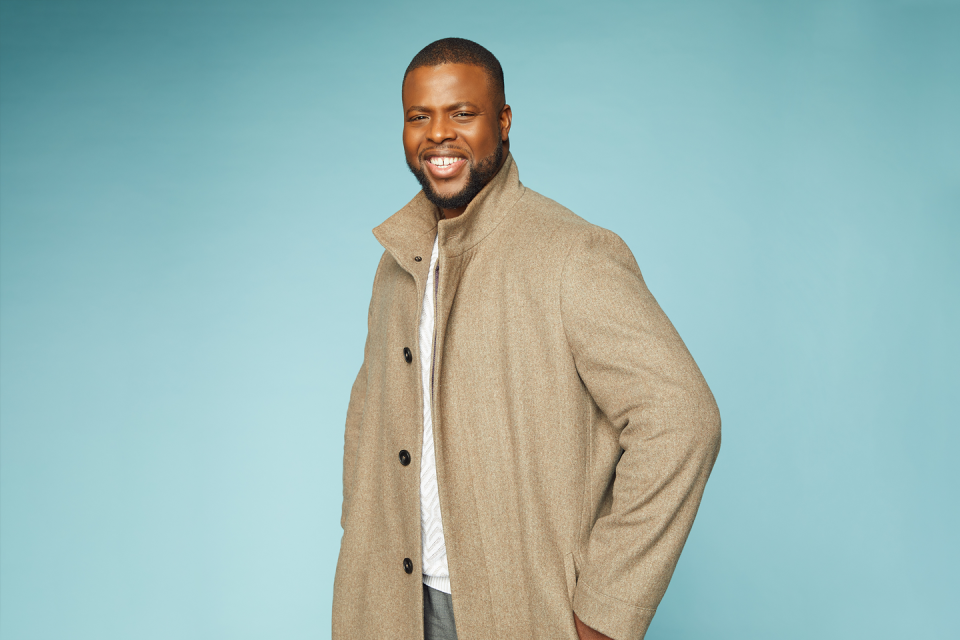
And on that note, Duke begins to slouch comfortably into a plush gray chair, yawning after a long day of doing interviews and posing for photos. He says he doesn’t have any complaints, though, about his grueling schedule, which most recently included landing in London one night and waking up in Berlin the next day. But instead of succumbing to his fatigue, Duke perks up at the mention of the Us premiere he’s headed to that evening.
“I’m excited that people are finally going to meet the film,” he says. “This movie, largely, talks about power and privilege, and how your privilege affects others you render invisible and silent. You will leave wondering who bears the weight of your decisions. It doesn’t let anyone off the hook.”
For a moment, he is very serious as he ponders the responsibility of challenging the culture's perception of him as a Black man. But after a few moments, he re-positions his tweed coat, and then, it's back: That signature Winston Duke smile. And as he walks out of the studio, his hearty laugh trails behind him.
Photography: Kathryn Wirsing assisted by Danielle Daly; Videographer: Rashawn Colton; Groomer: Martyse Lewis; Makeup: Laila Hayani; Stylist: Jenny Ricker.
For more ways to live your best life plus all things Oprah, sign up for our newsletter!

